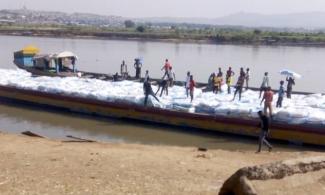
Sources confirmed Boko Haram insurgents get their food and fuel supplies from the diverted foodstuff and petroleum products. The smuggling also affects the nation’s economy.
Nigerian security operatives are significantly sabotaging the government’s efforts to eliminate Boko Haram and grow the nation’s economy.
Instead, they are helping in funnelling huge volumes of petrol and other fuel products to the deadly group, The NEXT EDITION can authoritatively report today.
Weeks of investigation by this newspaper has revealed how soldiers, police, customs, immigration and civil defence operatives frequently receive hefty bribes and turn a blind eye as fuel marketers and smugglers divert truckloads of petrol and foodstuffs to Boko Haram enclaves and neighbouring countries.
Through interviews with security operatives, marketers and undercover exploration of the dark market, this newspaper has obtained details of the well-coordinated transactions and is able to provide a glimpse into a largely unreported and unregulated operation that has clearly fed the insurgency and helped prolonged the nine-year war.
The reporting has also shown the impact of the large-scale murky operation on the nation’s petro-economy.
Highly classified sources said that put together, at least 60 trucks loaded with petrol and an equal number carrying foodstuff illegally leave the country through Adamawa State daily.
This newspaper learnt that Boko Haram insurgents get their food and fuel supplies from the stock of the diverted products.
Each day, operatives of the Nigerian Army, Nigeria Police, Nigeria Immigration Service, Nigerian Customs Service and the Nigeria Security and Civil Defence Corps manning the many checkpoints across Adamawa State extort bribes ranging from N500 to N300, 000 from motorists.
The smuggled fuel is sold at lucrative rates either to the Boko Haram group who have waged a war against the Nigerian state since 2009 or across the border.
Today, Nigeria’s subsidised petrol and foodstuff were being illegally sold in many countries including Cameroon, Niger, Chad and in the Central African Republic.
During the many years of the insurgency, the military said Boko Haram has relied on such smuggling to fuel their vehicles and motorcycles for their heinous attacks.
Repeatedly, security services in Borno, Gombe and Yobe have either arrested suspected Boko Haram fuel suppliers or seized huge consignments of petroleum products believed to have been directed at the militants.
In July 2016, the Army in Borno State arrested a man it said was the supplier of fuel to Boko Haram.
According to the News Agency of Nigeria, the suspect was arrested with a truck loaded with 25 jerry cans of petrol and other goods cleverly covered in cartons.
In January 2018, the NSCDC in Borno said it seized 1000 litres of petrol from suspected Boko Haram fuel suppliers, and in June, the Army said it arrested two men in Gombe for allegedly selling large quantities of fuel to Boko Haram.
In the January case, the NSCDC Commandant, Ibrahim Abdullahi, told the News Agency of Nigeria that the products were filled into jerry cans and concealed in sacks.
Concealing fuel-filled containers under sacks would turn out a common method for hiding smuggled or diverted products in neighbouring Adamawa as our investigation showed.
Government’s Move to Beat Sharp Petrol Deals
As part of measures to monitor daily fuel consumption across the country, the Federal Government in August adopted an automated fuel system management and sensor network.
According to the Minister of State for Petroleum, Ibe Kachikwu, the platform would reveal national consumption by tracking fuel supply from the ports to its final delivery in the petrol station.
An initiative of the Petroleum Equalisation Funds (PEF), the project enabled the licensing of every truck conveying fuel with a driver and a transport company so they could be apprehended if the products go missing.
Mr. Kachikwu had at the time boasted the exact daily fuel consumption in the country would be known for the first time.
“The essence of what PEF is doing is that this will enable us track refined petroleum product movement from the point of LC (letter of credit) opening from the vessels that come into Nigeria, up until the point where they are discharged into tanks in Nigeria, and from the tanks into trucks in Nigeria, monitor the trucks till they deliver the products into the storage tanks for the filling stations and they are discharged and sold,” the minister had said.
But like most government policies, the tracking project has failed to stop the diversion of petrol not only across the country’s borders but also to Boko Haram fighters.
How Marketers Beat NNPC’s Tracking System
Investigations by this newspaper revealed how marketers beat the NNPC’s monitoring devices and take products out illegally.
Shylock marketers now divert products after they have been delivered to filling stations in many parts of the North-east.
Each truck lifting product from the NNPC depot in Yola goes straight to a designated filling station and discharges into the underground tank.
With the monitoring system showing the product has been discharged, the marketers wait till nightfall before rallying young men to fill the product into hundreds of jerry cans and or drums brought from a storage bay.
The jerry cans and or drums are then loaded into trucks and a tarpaulin is rolled out to cover the illegal cargo from direct exposure to sunlight and heat before setting out to where the products are sold are very exorbitant prices.
On the surface of it, no one would believe petrol diversion could be a big business right inside Yola Metropolis.
But we found out some filling stations in Jambutu area of Yola are neck deep in the illegal business.
Some of the stations involved in the illegal deal are located close the Jambutu Bypass Roundabout.
Our correspondent learnt the police, military and customs authorities are aware of their activities.
Barkin Kogi Waterside in Jimeta is another area where petroleum products and foodstuff are being smuggled out to Boko Haram and neighbouring countries.
During a visit to the riverside, our correspondent saw dozens of young men loading bags of grains into a boat.
It was shocking to find out the grains were merely used to cover drums of petrol already stacked inside the boat.
We also found that the consignments that were already loaded in the boat came from a nearby NNPC filling station in the area.
“What happens is that the marketers fill drums and jerry cans with petrol and bring them here in the night using hand trucks,” an insider told our correspondent.
“The drums or jerry cans are first loaded into the boat before some bags of foodstuffs are used to cover the drums or jerry cans.
“All the security agencies represented here collect money before any boat is loaded. Even the military representative here collects money from each passenger boarding a boat in this waterside.”
Before any boat carrying grains and or petrol is allowed to set sail, cargo owners are made to pay N22, 000 to the customs, N80, 0000 to immigration, N70, 000 to marine police.
The military which has only Intelligence function at the waterside is said to receive N5, 000 per passenger boarding a boat in and out of the area.
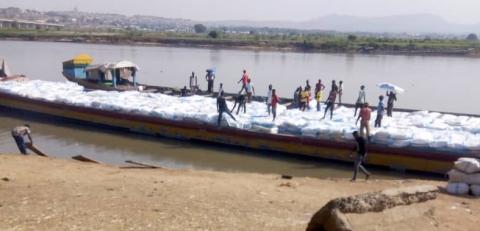
One of the biggest petrol smuggling rings uncovered in the course of this investigation is in Jabilamba, a community located about 20 kilometres from Yola Metropolis.
The illegal petrol depot is housed in an expansive compound nestled in the bush with hundreds of empty drums littering the place.
We learnt the site is jointly operated by powerful marketers who divert tankers from their filling stations and load the products for sale outside the country in jerry cans and drums.
At the time our correspondent sneaked into the depot, there was no activity going on but the strong smell of petrol and the drums that littered the compound gave an indication of what happens there.
“This place comes alive as soon as petrol tankers start rolling in and discharging products. So many young people earn living filling drums and jerry cans with petrol and loading them into trucks,” a local told our correspondent.
The NEXT EDITION learnt no fewer than 10 petrol tankers discharge petrol at the illegal deport on a daily basis and the products are being taken out of the country.
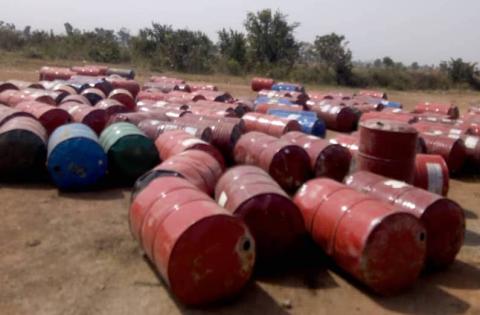
Another Adamawa hothouse of petrol diversion is Guri, a Nigerian border town in Fofure Local Government Area.
What separates the town from the Republic of Cameroon is a river that has long dried up, thereby providing easy access for people, including smugglers to move freely in and out of the two countries.
There are two filling stations in the area, Gari Multi-Services Ltd and H.S Gurin Investment Nigeria Ltd.
The third is still under construction.
Sources in the community confirmed the two service stations which are located less than a kilometre from the border, are involved in smuggling.
The properties are constructed with the filling station in front and a large fenced empty space behind.
Our correspondent, who stopped over to buy water spotted the sales boy filling several jerry cans with petrol and while four young men took them to the back of the station.
While pretending to use the restroom, our correspondent saw other young men putting the fuel-laden jerry cans into large bags and stacking them.
This was the same method those arrested by the NSCDC officials allegedly used.
Many commercial motorcyclists suspected to be Cameroonians were also seen crossing the dried river bed with six jerry cans tucked into bags and securely tied to the back of the motorbike.
We also learnt that several trucks loaded with petrol, foodstuffs and building materials go across the border to Cameroon daily.
“It is an open business here and a lot of people earn their living taking one thing or another across the border,” a local fixer told our correspondent.
At Gari Multi-Services Limited, our correspondent asked the sales boy whether it was possible to buy some quantity of petrol to be sent to his relation in Cameroon.
“Can I buy some petrol here and send to my brother in Cameroon,” our correspondent asked?
“Yes it is possible but you don’t have a jerry can. How are you going to do it,” the sales boy replied.
“I thought you have some jerry cans for sale here. I could have bought some. But do you know any Okada man who can help me take the product across the border,” our correspondent continued.
“I don’t have jerry cans and I don’t know any Okada who crosses the border with petrol,” the sales boy responded appearing suspicious of the reporter.
He walked away and refused to answer any more questions from our correspondent.
Many petrol stations in Mubi, Song, Hong, Michika and Madagali are said to be involved in the business of fuel diversion and smuggling and security agencies including the Department of State Services (DSS) are aware, highly classified sources said.
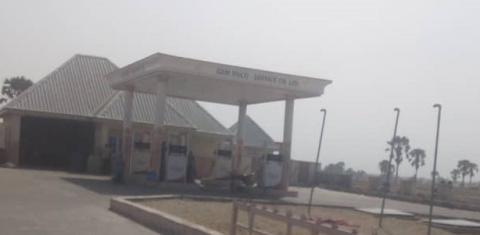
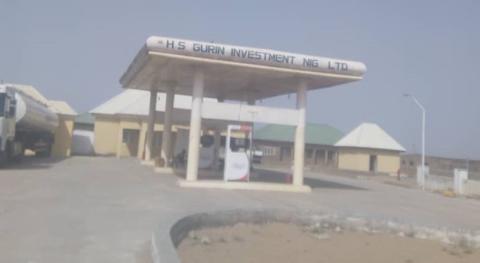
How security operatives encourage the criminal diversion of petrol and foodstuffs
With several checkpoints created in many parts of Adamawa State, investigation shows security operatives deployed to man them shamelessly aid and abet diversion of foodstuff and petrol.
In the course of the investigation, we found three checkpoints where marketers and foodstuff merchants bribe security operatives to allow them to divert badly needed petrol and grains.
At the Sangere by Moddibo Adama University of Technology (MAUTEC) gate, our correspondent reported that drivers park their trucks by the roadside and go straight to settle operatives of the NSCDC under a tree.
Instead of arresting drivers with truckloads of petrol-filed jerry cans and drums, the NSCDC officials rather collect N2, 000 bribe and let them divert the subsidised product and badly needed grains.
Less than 20 kilometers from the NSCDC checkpoint, is a military checkpoint in a town called Jabilamba.
At this checkpoint located in one of the most notorious “fuel depot,” truck drivers carrying petroleum products loaded into drums and jerry cans pay N500 while those carrying grains part with N2,000.
At a major checkpoint located in Mubi, popularly called “tollgate,” by motorists, our correspondent said soldiers extort drivers but do not check the contents of the vehicles.
It was learnt that a top officer at the local military formation in Mubi earns millions in bribes from drivers and traders plying the routes.
“Every truck driver passing the checkpoint is compelled to pay N2, 000 which is remitted to the commander,” a highly classified source said.
“He (commander) has a boy who keeps a register of all the trucks passing through the checkpoint. The boy ticks as each truck driver arrive and pays the money.
“At the end of the shift, the money is gathered and paid to the commander.”
The source said over 30 trucks loaded with 1330 x 30-litre jerry cans of petrol are smuggled out from filling stations across Mubi on a daily basis.
Our correspondent was taken to one of such filling stations where the criminal business is perpetrated and secretly recorded what was going on.
The leadership of Customs and Immigration in the state are also said to receive returns from their operatives extorting motorists and traders.
While the “big” man in customs is said to collect between N200, 000 –N250, 000 from every truck carrying petrol towards the border, his Immigration counterpart is said to charge every illegal immigrant coming in or out of the country.”
“The customs man issues a kind of clearance letter to the truck drivers so when they get to the last checkpoint jointly manned by his officers, the Police and Immigration, the document is shown and the officers on the ground would merely collect N6,000 as their share and allow the vehicle to pass without being checked.
“The Immigration officers extort every foreigner coming in or leaving the country and many of them come to Adamawa to buy petrol and foodstuffs,” the source told our correspondent,” a security source confided in our correspondent.
The police are not left out of the extortion bazar as officers and men deployed to checkpoints along the border areas get their own share and allow drivers to pass without routine search.
How the accused security agencies responded to inquiries
As part of measures to balance the report, our editors reached out to the spokespersons of the security agencies indicted in the investigation.
The Defence spokesperson, John Agim and his counterpart in the Nigerian Army, Yusuf Sani, were contacted on the telephone.
While Mr. Yusuf would not pick calls to his phone, he, however, requested for a text message which he replied about 12 hours after it was sent.
Mr. Agim would neither pick calls nor respond to our text messages.
In his response, however, Mr. Yusuf stated, “Thank you so much for your enquiry. The matter is being investigated and whatever is the outcome, we will let you know.
“However, we would like to state that the Nigerian Army does not tolerate any act of indiscipline or unprofessional behaviour from its personnel.”
The Police Public Relations Officer (PPRO) in the Adamawa State command, Othman Abubakar, thanked our editors for the enquiry and promised to report the matter to the Commissioner of Police (CP) during a strategic meeting of the command.
“Thank you, my brother. I have heard what you said and I will report it to the CP at our meeting during the week.
“I know the CP will take appropriate action on the matter,” Mr. Abubakar said.
On his part, the spokesperson of the Nigerian Customs, Joseph Attah, after consulting the Adamawa State comptroller said the service has no power under the law to impound trucks carrying goods within the country’s borders.
“You know we have licensed filing stations dotting many of the border villages. The first challenge the SC raised was when tankers come to pass, Customs would ask where they are going. If they have a licensed filling station at the next village, customs have no right to stop such trucks.
“He said it got to a point that dealers from these licensed stations came to meet the command and said Customs was stopping their properly licensed business.
“They said if our comptroller wouldn’t believe them, they would produce their signed complimentary cards showing the products came from the NNPC deport and meant to their respective filling stations located in the area.
“Secondly, when the supplies are delivered to the filling stations, some people come to buy the product in jerry cans and drums to take to some of the interior villages.
“You know because of the insurgency, many filling stations have been closed down and others blown up. So nearby villages need products.
“But the real issue is because of the security situation on the ground, Customs have limited patrols. I am told our men do not go to Madagali area.
“Sometimes, the military would ask our men not to go to certain areas because of the grave security situation. So our men are not completely in charge of the border areas in that part of the country.
“Besides, Customs cannot stop the movement of goods within the country. It is only when it is being taken out that we can deal with it,” Mr. Attah said.
He did not, however, comment on the alleged bribes paid to his colleagues or deny the allegation.
Responding on behalf of the NSCDC, its spokesperson, Emmanuel Okeh said the agency will carry out a full investigation into the allegations and anyone found culpable, dealt with in line with the principles of the law.
“I assure you that the Corps will carry out a full investigation into the allegation and anyone found culpable will be dealt with in line with the principles of the law,” he stated.
“Just last week, the commandant general ensured the payment of their allowances and the arrears as approved by the Federal Government.
“Therefore, they have no reason for getting themselves involved in any illicit activity. The Commandant General, Abdulahi Gana Muhammadu takes the welfare of personnel as a top priority so as to discourage them from carrying out or getting involved in illegal activities,” Mr. Okeh stated.
The spokesperson of the Nigerian Immigration Service, Sunday James, said the leadership of the agency has resolved to carry out a full-scale investigation into the matter.
“The Comptroller General said I should thank your organisation so much for being patriotic in embarking on the report,” Mr. James said.
“He has assured that a full investigation will be carried out on the matter and we will get back to you on our findings.
“He has also asked that if you have pieces of evidence, you can forward them to us as soon as possible to aid our investigation,” he said.